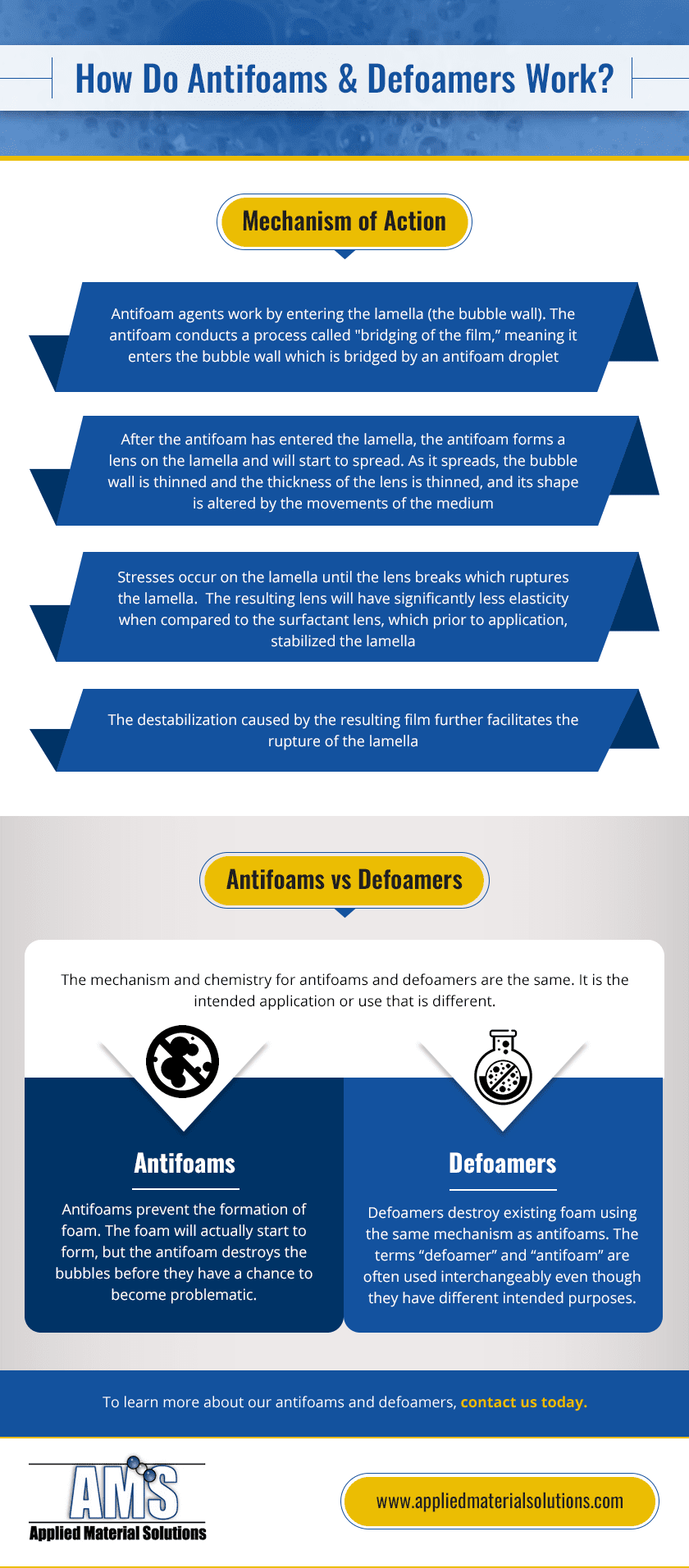Choosing the Right Defoamers for Your Industry Needs
Choosing the Right Defoamers for Your Industry Needs
Blog Article
The Role of Defoamers in Enhancing Item Top Quality and Efficiency
Defoamers serve as vital additives that minimize this concern, guaranteeing smoother production operations while improving the aesthetic and useful attributes of the final items. The choice of the appropriate defoamer can be critical to achieving optimum results, raising vital questions about formula compatibility and performance metrics that warrant more expedition.
Recognizing Defoamers
Recognizing the role of defoamers is essential for keeping product quality throughout various industries. Defoamers are chemical additives made to protect against the development and decrease of foam in fluid systems, which can detrimentally impact processes such as mixing, filling, and surface tension. Frothing can result in ineffectiveness, item defects, and compromised visual appeal, making defoamers a vital element in making procedures.
In industrial applications, defoamers help to improve item consistency and security. The effective usage of defoamers not only makes sure smoother manufacturing processes however likewise adds to remarkable product performance.
Additionally, the choice and formula of a defoamer need to straighten with details application demands, such as compatibility with other components, performance under varying temperature and pH conditions, and prospective regulatory restrictions. Ultimately, understanding defoamers' functions and their importance in numerous formulas is important for enhancing manufacturing and guaranteeing the finest final product.
Kinds Of Defoamers
Defoamers can be categorized right into several types based on their structure and system of activity. The primary kinds include silicone-based, non-silicone natural, and not natural defoamers.
Silicone-based defoamers are amongst one of the most efficient, mainly because of their capacity to spread out rapidly on the liquid surface area and disrupt foam formation. Their distinct chemical structure enables exceptional security, making them appropriate for high-temperature applications and settings with varying pH degrees.
Non-silicone organic defoamers, often made up of natural oils or fatty acids, are valued for their biodegradability and reduced poisoning. These are usually made use of in food and drink applications where security and ecological impact are extremely important.
Inorganic defoamers, which include compounds like talc or calcium carbonate, act by enhancing the thickness of the fluid, consequently minimizing foam stability. They are typically used in industrial processes where compatibility with various other products is not a problem.
Each kind of defoamer has distinctive advantages and restrictions, permitting for tailored options depending on the details lathering issues come across in numerous applications. Recognizing these distinctions is important for optimizing performance and achieving desired product high quality.
Applications Across Industries
Numerous sectors utilize defoamers to boost item quality and functional performance. In the food and beverage field, defoamers are critical in processes such as developing and dairy products manufacturing to avoid foam formation, which can result in ineffectiveness and product variance. By controlling foam, suppliers can make sure better return and a more consistent item.
In the pharmaceutical market, defoamers play a vital duty in the formulation of fluid medications, where too much foam can hinder blending and accurate application. Their use helps maintain the honesty of the formulations and promotes smoother production procedures.
The paint and coverings sector also counts on defoamers to improve the performance of items during application. By lessening foam, these ingredients guarantee a smoother surface and boost the aesthetic high qualities of the end product.

Advantages of Using Defoamers
While the application of defoamers varies throughout sectors, their advantages continually improve item top quality and procedure performance. One substantial benefit is the reduction of foam formation Continue during manufacturing procedures, which can or else cause manufacturing delays and disparities in product quality. By minimizing foam, defoamers make it possible for a smoother circulation of products, helping with much more efficient procedures and minimizing the probability of devices malfunctions.
In addition, making use of defoamers can enhance the appearance and appearance of end products. In sectors such as layers, paints, and food processing, too much foam can jeopardize the visual aesthetic appeals and total high quality, while the suitable defoamer application ensures a consistent surface and preferable attributes. Additionally, defoamers can add to set you back savings by lowering waste during manufacturing and enhancing the use of resources (defoamers).

Selecting the Right Defoamer
Selecting the best defoamer is important for enhancing production processes and making sure product high quality. The option of defoamer influences not only the effectiveness of foam control yet additionally the total efficiency attributes of the last product. Elements to consider consist of the sort of application, the chemistry of the formula, and the environmental conditions under which the item will certainly be utilized.
Various sectors might need particular defoamer types, such as silicone-based, natural, or polymeric defoamers. Recognizing the compatibility of the defoamer with the main ingredients is necessary to avoid adverse responses that might compromise item stability. Additionally, the defoamer's performance in numerous temperatures and pH degrees need to be assessed to ensure regular performance.
Testing the defoamer in small applications can offer beneficial insights right into its performance and viability. Factor to consider of regulatory conformity, especially in food, drugs, and cosmetics, is paramount in choosing a defoamer. Ultimately, a detailed evaluation of these variables will cause the option of a defoamer that not only manages foam effectively however additionally enhances the quality and efficiency of the end product.
Final Thought

To conclude, defoamers are important additives that substantially boost product quality and performance across numerous sectors. By effectively decreasing foam development, these representatives not just boost functional performance yet also contribute to the aesthetic and functional stability of items. The critical option and application of published here defoamers lead to cost savings, optimized resource use, and enhanced customer complete satisfaction. Generally, the value of defoamers official site in commercial procedures can not be overemphasized, as they play an essential duty in attaining premium and constant outcomes.
Frothing can lead to ineffectiveness, product defects, and endangered visual appeal, making defoamers a crucial component in making operations.

Report this page